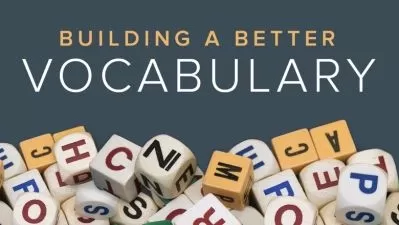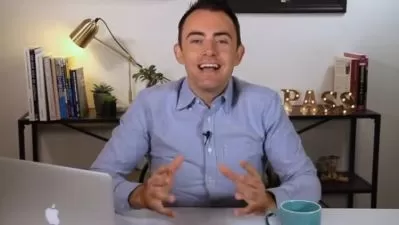English Grammar Boot Camp
Anne Curzan
12:33:00
Description
Attention: There are no less than five intentional grammatical “errors“ in this course description. If you can’t identify at least five, we recommend that you get this course!
Grammar! For many of us, the word triggers memories of finger-wagging schoolteachers, and of wrestling with the ambiguous and complicated rules of using formal language. But what is grammar, really? In fact, it’s the integral basis of how we speak and write.
As such, a refined awareness of grammar opens a world of possibilities for both your pleasure in the English language and your skill in using it, in both speech and the written word. As a foundation for writing, a detailed grounding in grammar and usage will hugely expand your resources for meaningful verbal expression, for navigating the subtleties of the language, and for achieving clarity of communication and stylistic power.
In English Grammar Boot Camp, linguist and popular Great Courses professor Anne Curzan of the University of Michigan takes you on an enjoyable exploration of the essential aspects of English grammar. These 24 spirited and accessible lectures offer you a comprehensive core training—a linguistic “boot camp,” by which we mean a thorough immersion in all of the key elements of English grammar and usage, in their most immediate, practical application.
Speaking with incisive insight, a Socratic teaching style, and refreshing humor, Professor Curzan leads you sequentially through the workings of the many parts of speech, from nouns, pronouns, adjectives, verbs, and adverbs to the fine points of determiners, intensifiers, prepositions, coordinating and subordinating conjunctions, conjunctive adverbs, dangling modifiers, and more. In the final part of the course, you’ll combine all of these elements to take a penetrating look at matters of style and clarity, in settings ranging from daily speech to formal, academic, and scientific writing.
Delve Deeply into the Inner Workings of English
Regarding grammar and style, anyone can read a usage guide. But English Grammar Boot Camp provides something significantly more: a breadth of perspective and context you won’t find elsewhere, leaving you with a more choices and rich verbal resources for your own use of the language.
In discussing the different parts of speech, Professor Curzan directs your attention to how the element at hand evolved, often going as far back as the Renaissance or Old English. Highlighting reflections from 18th- and 19th-century usage guides as well as from multiple modern commentators, she guides you in examining real-world language use in a variety of contexts, helping you develop a sophisticated frame of reference and a deep awareness of the idiosyncrasies of English.
As an emblematic aspect of the course, Professor Curzan repeatedly demonstrates the value of being open-minded about the strong points and weaknesses of grammatical rules. She shows convincingly that we benefit greatly when we learn the history of prescriptive rules and compare the rules to the way speakers and writers use the language. This allows us to make informed decisions about when we want to adhere to the theoretically or formally “correct” and when we don’t. In this arena, you’ll uncover examples of “questionable” usage for rhetorical purposes by a range of brilliant writers, discovering that history’s grammatical scofflaws include the likes of William Shakespeare, whom used many double comparisons, and the framers of the U.S. Constitution, who spoke of a “more perfect” Union.
You’ll also take account of the tendency of the English-speaking populace to regularize the language over time, replacing a wonderful past participle such as “mown” with “mowed” and opting for plural “emojis” rather than “emoji.” Throughout the course. You’ll devote attention to the significant differences between spoken and written English.
The lectures of English Grammar Boot Camp serve up a banquet of grammatical insights, all of which will richly inform and deepen your skill with the language.
Study the Fine Points of Grammatical Usage
In the course of the lectures, you’ll investigate the building blocks of English grammar in detail, shedding light on numerous practical matters of usage, such as:
- Common conundrums of grammar: Refine your understanding of numerous confusing issues of grammar, such as when to use “who”vs.”whom” or “that”vs.”which”;the question of subject-verb agreement (“A jury of my peers is/are…”); the challenges of conjoined pronoun constructions (“My sister and I/me…”); and whether it’s acceptable to begin sentences with conjunctions or end them with prepositions.
- The anatomy of verbs: In mastering verb usage, gain clarity on verb tense (present, past, future) and aspect (progressive, present perfect, past perfect); how verbs function intransitively (“I read every day”) and transitively (“I read the newspaper”), and the functions of primary auxiliaryverbs(be/have/do) and modal auxiliary verbs(might/could/should).
- The uses of the passive voice: Discover how the passive voice(as in, “Mistakes were made”), which we’re often counseled to avoid, has remarkable benefits in formal writing, such as for maintaining narrative continuity, for promoting a sense of objectivity in scientific writing, and for handling situations where the responsibility for an action is unclear.
- Principles of punctuation: Clarify the meaning and usage of each of the punctuation marks and see how they organize information and shape meaning. In particular, investigate the punctuation marks that people are most confused about, such as the comma, semicolon, and dash, and the particular complexities of the apostrophe.
- The grammar of conversation: In studying the important differences between spoken and written English, take account of grammatical practices that are acceptable in speech but less so in writing, such as dangling modifiers, the use of discourse markers (such as “so,” “well,” and “oh”), and stranded prepositions.
- Grammar’s larger context: Look closely at how to present information with fluency and style in your writing, and grasp principles of clarity in scientific writing. Experiment with the known-new contract, a principle that helps readers follow your ideas by presenting known information before new information, within sentences and sequentially.
A Glorious Panorama of the English Language
Finally, Professor Curzans’ contagious passion for the subject matter and encyclopedic knowledge of the language make English Grammar Boot Camp an especially enthralling and enjoyable exploration. Throughout, Professor Curzan frames the course’s inquiry into grammar as a thoroughly remarkable tour of the language, offering countless illuminating observations on how English grammar and usage developed, and on the matter of how writers and grammarians down through the centuries have viewed the language and its communicative resources.
Ranging widely across the historical spectrum, Professor Curzan treats you to fascinating reflections on the history of grammatical practice (the verb “to go” has a mystifyingly irregular past tense, “went,” which was lifted from the verb “to wend”) and to a keen view of how the language changes over time, including in our own fast-moving era. For example, the modal verbs “must” and “shall” are now in serious decline, and we often “verb” nouns (“to google”) and “noun” verbs (“a hire”). To give perspective on conscious grammatical choice, she cites memorable examples of inadvertently amusing English usage (“Property owners and occupants of dwellings suffering damage from squirrel, raccoon, red fox and coyote, or their agents designated in writing…”).
The delightful and superbly insightful lectures of English Grammar Boot Camp offer you a unique opportunity to explore the linguistic riches of the English language, and to significantly deepen your mastery of grammar, usage, and style. This mastery will enable you to use English more competently and confidently in every context.
More details
User Reviews
Rating
Anne Curzan
Instructor's Courses
The Great Courses
View courses The Great Courses- language english
- Training sessions 24
- duration 12:33:00
- English subtitles has
- Release Date 2023/06/06











